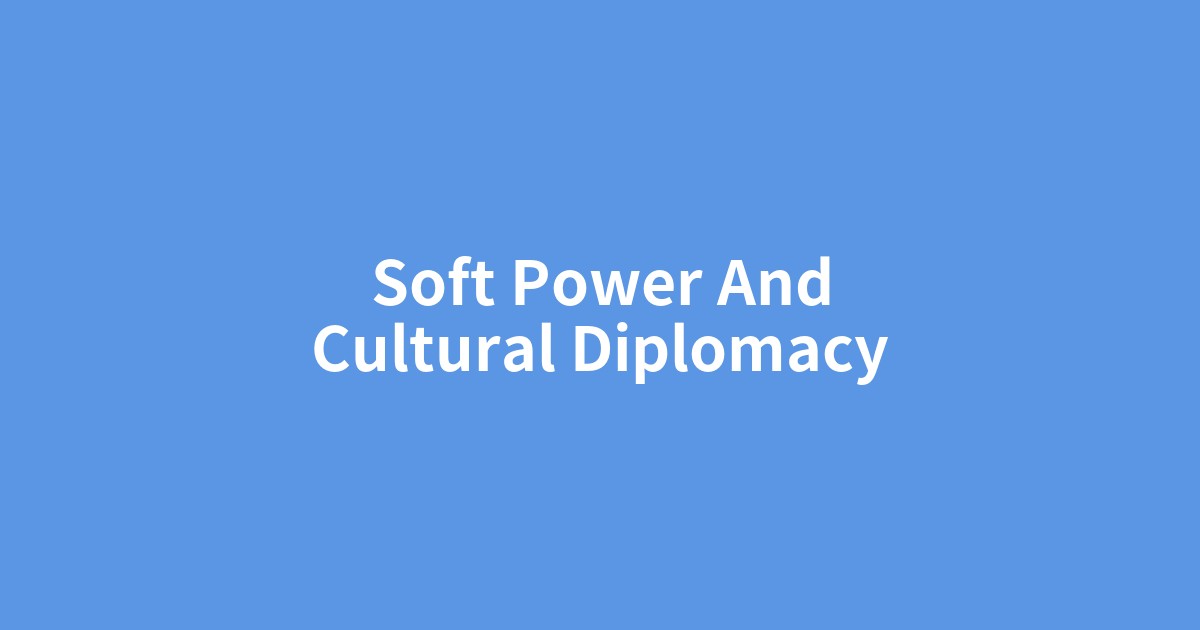このページは、歴史や文化の物語を楽しみながら、その文脈の中で重要な英単語を自然に学ぶための学習コンテンツです。各セクションの下にあるボタンで、いつでも日本語と英語を切り替えることができます。背景知識を日本語で学んだ後、英語の本文を読むことで、より深い理解と語彙力の向上を目指します。

軍事力や経済力(ハードパワー)だけではない。文化や価値観の魅力によって、他国を惹きつけ、国際社会で影響力を持つ「ソフトパワー」戦略。
この記事で抑えるべきポイント
- ✓「ソフトパワー」とは、軍事力や経済力といった「ハードパワー」とは異なり、文化、政治的価値観、外交政策の魅力によって他国を惹きつけ、自国の望む結果を得ようとする力のことです。
- ✓ソフトパワーの源泉は多岐にわたりますが、主にポップカルチャーや伝統などの「文化」、民主主義や人権といった「政治的価値観」、そして国際協力や開発援助などの「外交政策」が挙げられます。
- ✓「文化外交」はソフトパワーを実践する具体的な戦略であり、米国のハリウッド映画、韓国のK-POP、日本の「クールジャパン」戦略など、各国が独自の文化を用いて国際的な影響力を高めようと試みています。
- ✓ソフトパワーは万能ではなく、一方的な文化の押し付けやプロパガンダと見なされるリスクも存在します。その効果は測定が難しく、長期的な視点で評価する必要があるという側面も持っています。
ソフトパワーと文化外交
私たちが日常的に楽しむ海外の映画や音楽、そしてファッション。なぜこれほどまでに心を惹きつけられるのでしょうか。この記事では、軍事力や経済力といった物理的な力だけでは測れない国の影響力、「ソフトパワー」という概念を紐解きます。魅力によって世界を動かす、その見えざる力の正体に迫ります。
Soft Power and Cultural Diplomacy
The foreign films, music, and fashion that we enjoy in our daily lives—why are they so captivating? This article delves into the concept of 'soft power,' a nation's influence that cannot be measured by physical force like military or economic strength alone. We will explore the true nature of this invisible force that moves the world through its appeal.
「ソフトパワー」とは何か? - 魅力という名の力
「ソフトパワー」とは、ハーバード大学の政治学者ジョセフ・ナイによって提唱された概念です。これは、軍事力による強制や経済力による買収といった「ハードパワー」とは対照的な力と位置づけられます。ソフトパワーの核心は、自国の文化や政治的価値観、外交政策が持つ魅力(attraction)によって他国の人々を惹きつけ、共感を得ることで、自国が望む結果へと間接的に導く力のことです。つまり、相手を無理やり従わせるのではなく、相手が「そうしたい」と思うように働きかける、非常に洗練された影響(influence)力の行使と言えるでしょう。
What is 'Soft Power'? - The Power of Attraction
The term 'soft power' was coined by Harvard University political scientist Joseph Nye. It is positioned as a force contrasting with 'hard power,' which involves coercion through military force or inducement through economic might. The core of soft power is the ability to indirectly lead other countries to desired outcomes by captivating their people and earning their empathy through the attraction of one's own culture, political values, and foreign policies. In other words, it is a sophisticated exercise of influence that encourages others to 'want' what you want, rather than forcing them into compliance.
ソフトパワーの源泉 - 何が国の魅力を生み出すのか
では、ソフトパワーは具体的に何から生まれるのでしょうか。ナイは主に3つの源泉を挙げています。第一に、他国にとって魅力的に映る「文化(culture)」です。これには、日本のアニメや漫画、アメリカのハリウッド映画、韓国のK-POP、イタリアの食文化など、ポップカルチャーから伝統芸術まで幅広く含まれます。第二に、国内外で実践されている「政治的価値観」です。民主主義、人権、自由といった普遍的な価値観を掲げ、それを守る姿勢は、他国からの信頼と尊敬を集めます。そして第三に、正当で道徳的権威があると見なされる「外交政策」です。国際協調の推進、平和維持活動への貢献、開発途上国への援助といった活動は、国の評価を高め、ソフトパワーを強化するのです。
The Sources of Soft Power - What Creates a Nation's Appeal?
So, where does soft power specifically come from? Nye identifies three main sources. First is a nation's culture, when it is seen as attractive to others. This broadly includes everything from pop culture, like Japanese anime and manga, American Hollywood films, and Korean K-pop, to traditional arts and Italian cuisine. The second source is its 'political values' as practiced both at home and abroad. Upholding universal values such as democracy, human rights, and freedom earns trust and respect from other nations. The third source is 'foreign policies' that are seen as legitimate and having moral authority. Promoting international cooperation, contributing to peacekeeping missions, and providing aid to developing countries enhance a nation's reputation and strengthen its soft power.
「文化外交」の実践 - 世界を魅了する国家戦略
ソフトパワーを国家戦略として積極的に活用する試みが「文化外交」です。これは、文化交流を通じて国家間の相互理解を深め、自国への好意的なイメージを醸成することを目的とした外交(diplomacy)活動の一環です。例えば、日本政府が推進する「クールジャパン」戦略は、アニメやゲーム、食といった日本の現代文化を世界に発信することで、国際社会における日本の存在感を高めようとするものです。また、韓国の「韓流ブーム」は、政府の支援も受けながら世界的な現象となり、韓国製品や観光への関心を飛躍的に高めました。歴史を遡れば、冷戦時代にアメリカがジャズミュージシャンを世界中に派遣した「ジャズ外交」も、自由な表現の象徴としてアメリカの魅力を伝える文化外交の好例です。
The Practice of 'Cultural Diplomacy' - National Strategies to Charm the World
The active use of soft power as a national strategy is known as 'cultural diplomacy.' This is a form of diplomacy that aims to deepen mutual understanding between nations through cultural exchange and to foster a favorable image of one's own country. For example, the 'Cool Japan' strategy promoted by the Japanese government seeks to enhance Japan's presence in the international community by showcasing its contemporary culture, such as anime, games, and food. Similarly, South Korea's 'Hallyu Wave,' supported by its government, became a global phenomenon, dramatically increasing interest in Korean products and tourism. Looking back in history, America's 'Jazz Diplomacy' during the Cold War, which sent jazz musicians around the world, is another prime example of cultural diplomacy that conveyed the appeal of the United States as a symbol of free expression.
ソフトパワーの光と影 - プロパガンダとの境界線
しかし、ソフトパワーは万能ではありません。その活用には慎重さが求められます。なぜなら、一歩間違えれば、それは単なる一方的な宣伝活動、すなわち「プロパガンダ(propaganda)」と受け取られかねないからです。ソフトパワーが自発的な魅力に基づく双方向の関係を目指すのに対し、プロパガンダは意図的な情報操作によって大衆を特定の方向に導こうとする点で根本的に異なります。この両者の境界線は非常に曖昧であり、国家が文化を戦略的に利用する際には、常に「文化の押し付け」や「政治利用」と批判されるリスクが伴います。また、発信側の意図通りに文化が受け入れられるとは限らないという点も、ソフトパワーの難しさを示しています。
The Bright and Dark Sides of Soft Power - The Line with Propaganda
However, soft power is not a panacea. Its application requires caution because, if mishandled, it can be perceived as mere one-sided advertising, or propaganda. While soft power aims for a two-way relationship based on voluntary attraction, propaganda is fundamentally different in that it seeks to guide the public in a specific direction through deliberate information manipulation. The line between the two is often blurry, and when a state strategically uses culture, it always runs the risk of being criticized for 'cultural imposition' or 'political exploitation.' Furthermore, the fact that culture is not always received as the sender intended also illustrates the difficulty of soft power.
結論
この記事では、魅力によって他国に影響を与える「ソフトパワー」という概念について、その源泉から具体的な戦略、そして課題に至るまでを解説しました。現代の複雑な国際関係において、軍事力や経済力だけでは解決できない問題が増える中、相互理解と共感を基盤とするソフトパワーの重要性はますます高まっています。私たちが日々何気なく接している映画や音楽の裏側には、実はこのような国家間の静かなる駆け引きや戦略が存在するのかもしれません。この視点は、きっとあなたの世界を見る解像度を少しだけ上げてくれるはずです。
Conclusion
In this article, we have explained the concept of 'soft power'—the ability to influence other countries through attraction—covering its sources, specific strategies, and challenges. In today's complex international relations, where an increasing number of problems cannot be solved by military or economic power alone, the importance of soft power, based on mutual understanding and empathy, is growing. Behind the movies and music we casually encounter every day, there may exist these quiet maneuvers and strategies between nations. This perspective will surely enhance your resolution for viewing the world.
テーマを理解する重要単語
contemporary
「現代の」という意味で、この記事では「クールジャパン」戦略が日本の「現代文化」を発信するものであると説明する際に使われています。伝統文化だけでなく、アニメやゲームといった今現在の文化がソフトパワーの重要な源泉であることを示すためのキーワードです。
文脈での用例:
The museum specializes in contemporary art.
その美術館は現代美術を専門としている。
attraction
ソフトパワーの源泉である「魅力」を指す中心的な単語です。この記事では、文化や価値観が持つ「魅力」が、他国の人々を惹きつけ、共感を得る力の源であると説明されています。ソフトパワーがなぜ機能するのか、その根本原理を理解する鍵です。
文脈での用例:
The main attraction of the city is its beautiful architecture.
その都市の主な魅力は、その美しい建築です。
influence
「影響」を意味し、この記事の核心概念であるソフトパワーの本質を説明する上で不可欠です。軍事力のような直接的な強制ではなく、魅力によって間接的に「影響」を与えるという、ソフトパワーの洗練された性質を理解する鍵となります。
文脈での用例:
His parents still have a great deal of influence over his decisions.
彼の両親は今でも彼の決断に対して大きな影響力を持っている。
foster
「育む、促進する」という意味の動詞です。この記事では、文化外交が「自国への好意的なイメージを醸成する(foster a favorable image)」ことを目的とすると説明されています。時間をかけてゆっくりと関係や感情を育てていくニュアンスが重要です。
文脈での用例:
The university aims to foster a spirit of inquiry among its students.
その大学は学生たちの探究心を育むことを目指している。
empathy
他者の感情を自分のことのように理解し、共有する「共感」を意味します。ソフトパワーが、相手を無理に従わせるのではなく、魅力によって「共感」を得ることで機能すると説明されており、その人間的な側面と力の源泉を理解する上で非常に重要です。
文脈での用例:
He has a deep empathy for the struggles of the poor.
彼は貧しい人々の苦闘に深い共感を抱いている。
legitimate
「正当な」という意味で、ソフトパワーの源泉の一つである「外交政策」が持つべき性質として登場します。その政策が国際社会から見て「正当で道徳的権威がある」と見なされることが、国の評価を高め、ソフトパワーを強化する上で重要だと論じられています。
文脈での用例:
The army has a legitimate reason to be present in the area.
軍がその地域に駐留するには正当な理由がある。
diplomacy
国家間の公式な関係を扱う「外交」を指します。この記事では、文化を手段として国家イメージ向上を目指す「文化外交」という重要な戦略が紹介されており、その概念を正確に捉えるために必須の単語です。国際関係を語る上で基本となります。
文脈での用例:
The crisis was resolved through quiet diplomacy.
その危機は水面下の外交によって解決された。
inducement
「誘因」や「動機付け」を意味し、本文では経済力による「買収」を指して使われます。ハードパワーが「強制(coercion)」と「誘因(inducement)」から成ることを示す重要な単語です。ソフトパワーとの対比を理解する上で欠かせません。
文脈での用例:
They offered him a large salary as an inducement to join the company.
彼らは彼に入社するよう誘因として高額な給料を提示した。
maneuver
「駆け引き」や「策略」を意味し、しばしば巧妙さを伴う行動を指します。結論部分で、私たちが楽しむ文化の裏にある「国家間の静かなる駆け引き」として登場します。国際関係の舞台裏で繰り広げられる戦略的な動きを表現するのに最適な単語です。
文脈での用例:
Through a series of clever maneuvers, she secured the leadership of the party.
一連の巧みな策略を通じて、彼女は党の指導権を確保した。
propaganda
意図的な情報操作による一方的な「宣伝活動」を指します。この記事では、ソフトパワーが陥りかねない危険性として、このプロパガンダとの境界線の曖昧さが指摘されています。ソフトパワーの光と影を理解する上で、極めて重要な批判的視点を提供する単語です。
文脈での用例:
The government used propaganda to win public support for the war.
政府は戦争への国民の支持を得るためにプロパガンダを利用した。
coercion
「強制」や「威圧」を意味し、軍事力などを用いるハードパワーの特徴を定義する言葉です。この記事では、魅力で惹きつけるソフトパワーと対比される概念として登場します。この単語を理解することで、両者の力の行使方法の根本的な違いが明確になります。
文脈での用例:
He claimed he signed the confession under coercion.
彼は強制されて自白書に署名したと主張した。
resolution
本来は「解像度」や「決意」を意味しますが、この記事では比喩的に「世界を見る解像度」を上げる、という表現で使われています。ソフトパワーの視点を持つことで、物事をより鮮明に、多角的に理解できるようになるという筆者のメッセージを象徴する印象的な用法です。
文脈での用例:
The UN Security Council passed a resolution demanding a ceasefire.
国連安全保障理事会は停戦を要求する決議を採択した。
panacea
「万能薬」という意味で、あらゆる問題を解決できる魔法のような解決策を指します。この記事では「ソフトパワーは万能ではない(not a panacea)」と述べられており、その限界と課題を指摘する文脈で効果的に使われています。議論に深みを与える語彙です。
文脈での用例:
Technology is not a panacea for all our problems.
テクノロジーは我々のすべての問題に対する万能薬ではない。